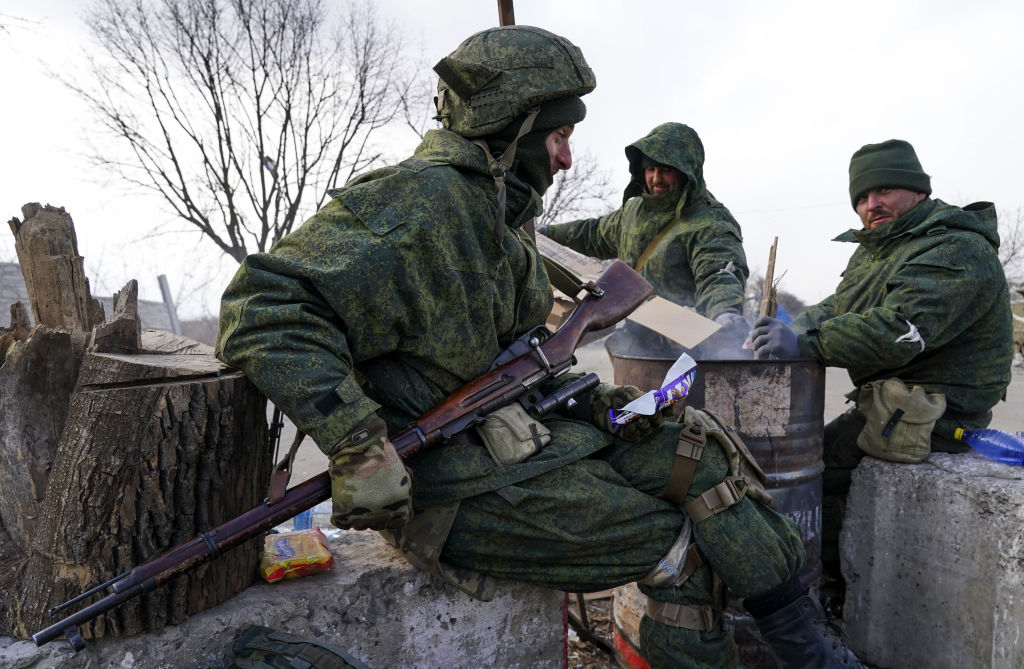After heavy losses and few gains, Russia may be moderating its ambitions in Ukraine


A free daily email with the biggest news stories of the day – and the best features from TheWeek.com
You are now subscribed
Your newsletter sign-up was successful
Senior U.S. officials are coming to believe that Russia has moderated its war goals in Ukraine after stiff resistance inflicted heavy losses and shattered any hope of a swift and easy victory, The Wall Street Journal reported Monday.
Per the Journal, international observers believed Russian President Vladimir Putin's initial objective was to capture Kyiv within days, depose Ukrainian President Volodymyr Zelensky, and install a pro-Russian puppet regime.
Now, Biden administration officials told the Journal, Putin's goals appear to be less ambitious. If Putin can bully Ukraine into accepting neutrality, recognizing Russian claims on Crimea and the Donbas, and surrendering a "land bridge" connecting the two, he'll be able to spin that as a win back home.
The Week
Escape your echo chamber. Get the facts behind the news, plus analysis from multiple perspectives.

Sign up for The Week's Free Newsletters
From our morning news briefing to a weekly Good News Newsletter, get the best of The Week delivered directly to your inbox.
From our morning news briefing to a weekly Good News Newsletter, get the best of The Week delivered directly to your inbox.
Securing this land bridge would require capturing the port city of Mariupol. Russian forces encircled the city weeks ago and have been pushing into its neighborhoods in recent days. On Sunday, Russia demanded that the city surrender, but Ukrainian Deputy Prime Minister Iryna Vereshchuk replied early Monday that "[t]here can be no question of surrender," Reuters reports.
Putin may well be looking for an off-ramp from this war. An assessment released Saturday by the Institute for the Study of War in Washington, D.C., concluded that Ukraine has "defeated the initial Russian campaign" and that Russian forces must take a "lengthy operational pause" to regroup if they are to have any chance of capturing major Ukrainian cities.
In an address to the nation on Sunday, Zelensky said Ukrainian forces have killed over 14,000 Russian troops since the invasion began less than four weeks ago. The U.S., which estimates Russian military deaths at around 7,000, lost just over 4,500 troops during the nine-year Iraq War.
None of this is certain, however. The Institute for the Study of War released another assessment on Sunday reporting that Russia appears to be "preparing its population" for a protracted conflict by "implementing increasingly draconian mobilization measures."
A free daily email with the biggest news stories of the day – and the best features from TheWeek.com
Grayson Quay was the weekend editor at TheWeek.com. His writing has also been published in National Review, the Pittsburgh Post-Gazette, Modern Age, The American Conservative, The Spectator World, and other outlets. Grayson earned his M.A. from Georgetown University in 2019.
-
 The environmental cost of GLP-1s
The environmental cost of GLP-1sThe explainer Producing the drugs is a dirty process
-
 Greenland’s capital becomes ground zero for the country’s diplomatic straits
Greenland’s capital becomes ground zero for the country’s diplomatic straitsIN THE SPOTLIGHT A flurry of new consular activity in Nuuk shows how important Greenland has become to Europeans’ anxiety about American imperialism
-
 ‘This is something that happens all too often’
‘This is something that happens all too often’Instant Opinion Opinion, comment and editorials of the day
-
 What is ‘Arctic Sentry’ and will it deter Russia and China?
What is ‘Arctic Sentry’ and will it deter Russia and China?Today’s Big Question Nato considers joint operation and intelligence sharing in Arctic region, in face of Trump’s threats to seize Greenland for ‘protection’
-
 What would a UK deployment to Ukraine look like?
What would a UK deployment to Ukraine look like?Today's Big Question Security agreement commits British and French forces in event of ceasefire
-
 Would Europe defend Greenland from US aggression?
Would Europe defend Greenland from US aggression?Today’s Big Question ‘Mildness’ of EU pushback against Trump provocation ‘illustrates the bind Europe finds itself in’
-
 Did Trump just end the US-Europe alliance?
Did Trump just end the US-Europe alliance?Today's Big Question New US national security policy drops ‘grenade’ on Europe and should serve as ‘the mother of all wake-up calls’
-
 Is conscription the answer to Europe’s security woes?
Is conscription the answer to Europe’s security woes?Today's Big Question How best to boost troop numbers to deal with Russian threat is ‘prompting fierce and soul-searching debates’
-
 Trump peace deal: an offer Zelenskyy can’t refuse?
Trump peace deal: an offer Zelenskyy can’t refuse?Today’s Big Question ‘Unpalatable’ US plan may strengthen embattled Ukrainian president at home
-
 Vladimir Putin’s ‘nuclear tsunami’ missile
Vladimir Putin’s ‘nuclear tsunami’ missileThe Explainer Russian president has boasted that there is no way to intercept the new weapon
-
 The Baltic ‘bog belt’ plan to protect Europe from Russia
The Baltic ‘bog belt’ plan to protect Europe from RussiaUnder the Radar Reviving lost wetland on Nato’s eastern flank would fuse ‘two European priorities that increasingly compete for attention and funding: defence and climate’
